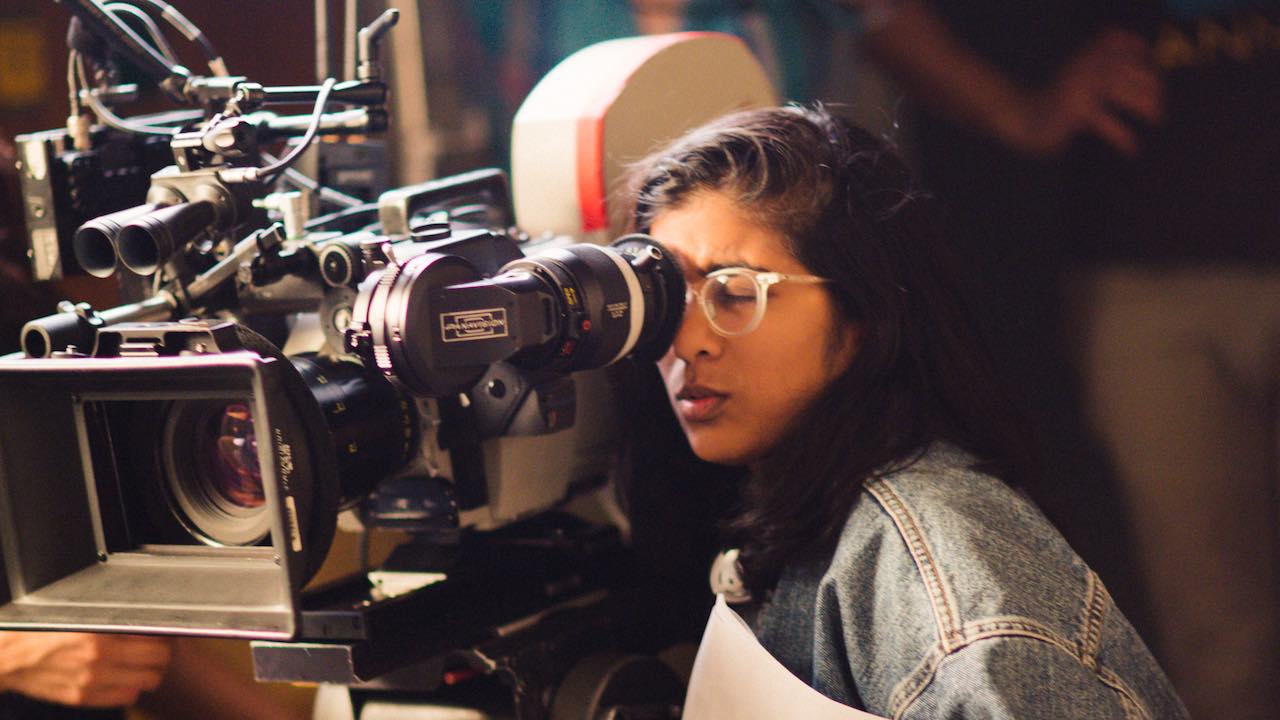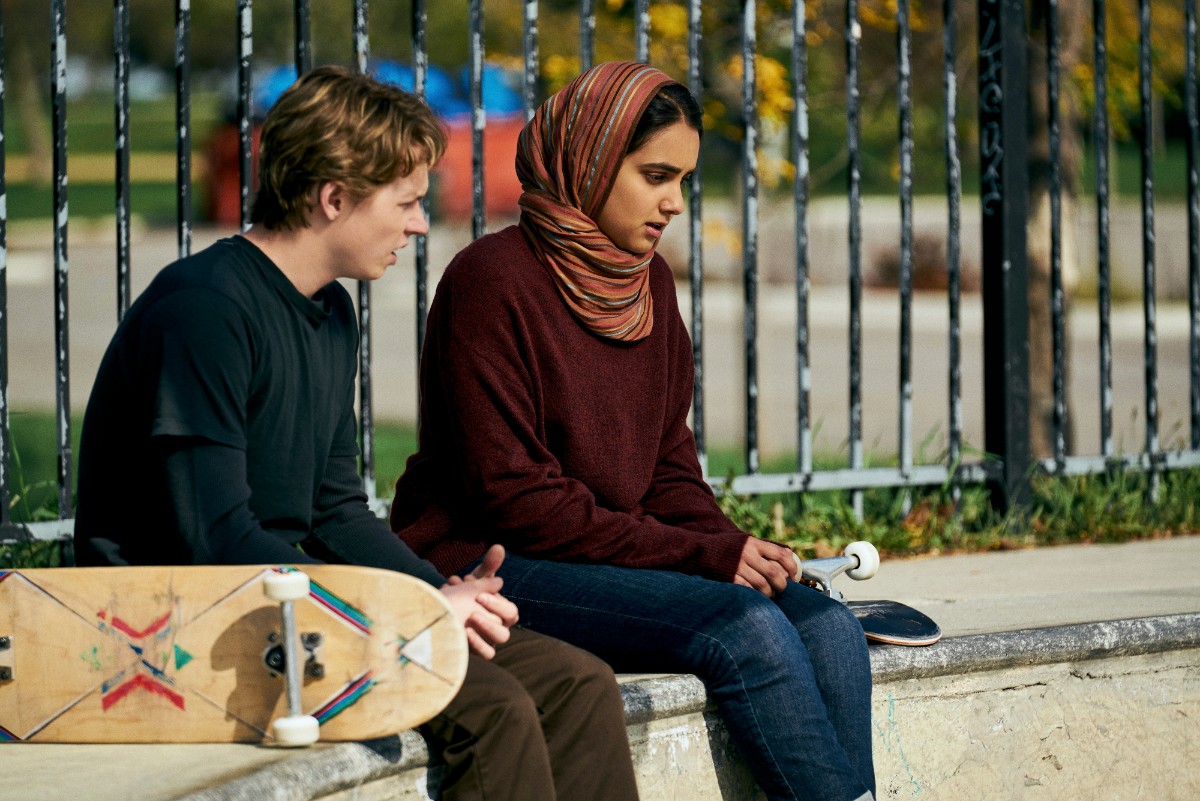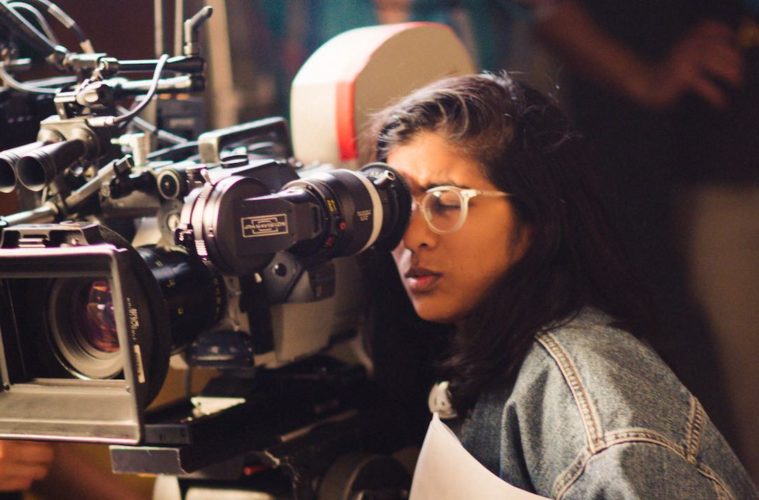
As her superb film Hala becomes available in movie theaters starting this week and on Apple TV+ next month, we sat down with writer-director Minhal Baig to discuss the long road to realizing the project as a feature, avoiding the narrative pitfalls of a coming-of-age story, and utilizing fear as a creative advantage.
“Geraldine Viswanathan, welcome to the rest of your career. The young star, who stole scenes in last year’s comedy Blockers, is the lead in Hala, written and directed by Minhal Baig,” I said in my review from Sundance. “She plays the titular character, a Muslim teenager coming to terms with her parents’ expectations, her religion’s expectations, and the expectations she has for herself. Sundance has offered plenty of coming-of-age stories throughout the years. Few are as effective as this one.”
Check out our conversation below.
What was that process of getting Hala made into a feature and then picked up and distributed by Apple? From conception to making the concept short to where we are now.
You know, it was a long process. It was sort of sprung out of writing these vignettes from when I was a child and putting those together eventually became the foundation of the screenplay. I moved to Los Angeles in 2015 and I had a feature version, a very early draft of Hala that was written. And then I moved with the intention of making that movie but I knew that it was going to be difficult to get financing without some kind of proof of concept. So I wrote the short second. The focus was going to be on this one piece of the [feature] film and whatever could be contained within like fifteen minutes. The short was put together by recruiting AFI graduates and just friends in Los Angeles to help shoot. And we shot it in 2015 and we raised all this money on Kickstarter and we had a surprisingly a lot of success. We raised like thirty-thousand dollars. And I remember being on set and shooting the film and realizing that the feature in my head was still ever-present and I was making something that was going to convey why the story was important and the visual language of it.
Then we came out with the short in 2016. I submitted to a couple of festivals and we just didn’t get accepted anywhere so we put it on the internet and we found that it was very successful…A lot of people reached out to me saying that it really touched them and that it resonated with them. So with the short and the feature-length script I went out looking for a producer. It was then that Jada [Pinkett-Smith] got involved with the project. I went up to pitch her the feature after she had already seen the short and she was interested in putting her resources behind a filmmaker who otherwise would not get their film made. Specifically what she loved about this movie was that it was universal. Even though she doesn’t have the specific life experience of [the character] Hala, she felt that it was something all young women and even men could relate to. So she came on board and it was a very fast process from then.
We spent a year looking for financing and eventually found money in 2017. And the goal [became] to shoot in the fall. The script had gone through so many revisions by that point that it was an ever-changing document. Once we had the casting director come onboard the challenge was finding someone who could embody the highly internal conflict. And that’s when Geraldine [Viswanathan]’s tape came in. It was immediately clear that she was Hala, and she brought so many new dimensions to the character that I had not even previously written into the script. Once we had [Geraldine] the rest of the family was built out… it was a very fast process shooting the movie in Chicago. And a quick turnaround and edit! We were waiting for a long time to hear back from Sundance. I had started working on a TV show and in the middle of that we heard word that we had been accepted [to the film festival]. I think it was very early, maybe August.
Oh wow, nice.
Yeah it was really fast! And then it was the most painful experience waiting for months not being to tell anyone [that we got in to the fest]. But it was a long process. It was all born from me living in Chicago with my family and feeling like I really wanted to see a film with the dynamic my family had at home. And also explore the struggle of navigating multiple identities and being true to your faith and your culture while also remaining true to yourself as an individual. Those were all things I wanted to put in this film. A highly specific story of one person and it’s not an autobiography and there’s a lot of emotional truth in the movie that’s very grounded in the details of my life.
When you’re putting together a coming-of-age story like this–and like you said you had a lot of rewrites and making the short–are there any tropes or narrative stereotypes you are actively trying to avoid when you are making the feature? Any hurdles of not wanting to go down a familiar road?
So the cinematographer on this film, Carolina [Costa], and I watched a lot of coming-of-age films in preparation for shooting Hala. We were very aware of what else had been done in the genre and we were focused on making this story feel specific for this character. Because I have watched a lot of coming-of-age movies and they are a big influence on this film and, in some way, there are certain things that narratively made a lot of sense for Hala’s journey and felt familiar. But then there had to be somewhere else in the movie where it surprised people. Like we had to set something up, and then kind of knock it down.
We did that a couple of times in the story with Hala’s mom Eram (Purbi Joshi). We put her up as a character in the beginning [of the film] who is presented as an obstacle in Hala’s search for independence. In the end, we circle back to her and she becomes a more multi-dimensional person. And in the same way [Hala’s dad] Zahid (Azad Khan) is presented as Hala’s ally and they have a close relationship. That too is kind of knocked down and re-envisioned by the end of the movie. We wanted Hala’s story to have some familiar threads because those are the familiar threads of coming-of-age that everyone goes through. But then we wanted to have the specificity of her experience in that culture, in that faith and in this family. And that was going to be the thing that was new and different. How she recognizes that her parents are different people then she thought they were. The film is shedding a light of the limitations of her perspective too because we start the movie very much frustrated whenever Hala is getting blocked and then at the end we’re recognizing that she has a lot of work to do herself.
One of the things that works so well in the movie is what you’re talking about. Everybody gets to a point in their lives where they see their parents as human beings as opposed to their “parents.” The mother-daughter evolution in the movie is one of the strongest aspects. It’s so relatable across any spectrum. So this is your second feature. You made this movie 1 Night a couple of years back. What are you learning in making that first feature that you take into this second feature in terms of stuff to hone into, improve upon?
Working on 1 Night was very much like working on a student film, where it felt like learning processes more than anything else. And then Hala, for me, was my very first real feature because it was such a personal story and something I had been intending to write for a very long time but I was very scared to approach the subject matter. I was in a very vulnerable place when I was writing because I was afraid to make the movie and afraid of the judgment the script would maybe get. But the biggest thing I’ve learned in all my work is approaching that fear instead of running away from it. Even when I was working on Rami the episode I wrote was about someone confronting their own sinful nature and recognizing that they are a work in progress and constantly evolving. And then on Bojack [Horseman] it was a very similar story of someone realizing that they had so longed for the validation of a parental figure and that they have to step out from underneath that and be okay with themselves.
In Hala, it was this young woman who a lot of expectations have been placed on. Not just by culture and family, but individuals that do that. She’s expected to be the perfect daughter and friend… and in so many ways she’s not allowed to fail and be vulnerable and have her own sexual agency. The process of making the movie was a process of healing for me because I had all of this pain for quite a long time. That difficulty of existing, of feeling like I was constantly being shamed and judged by others, specifically within my own community. And that’s my family and sharing that was very difficult. Every time I approach something scary in my work I think I’m doing something right. I’ve learned that over everything else has been the biggest lesson because the moment I’m not fearful of what I have on the page, then it’s not really taking a risk. Even though Hala is a coming-of-age story and on the surface may feel like not [that risky], the risk in the film was making something really emotionally honest to my upbringing and my childhood. Then putting it out there in such a way with a character that’s imperfect and flawed. She’s not going to be this role model for you. Though, in my head, she is still a hero. When I started out [making films] I was always trying to like make a cerebral, intellectual experience. [Laughs.] Then I realized that doesn’t work for me. I need to come from a real place, a vulnerable place. It’s occasionally a place of pain but can also be a place of joy.
That’s interesting. I was reading some older interviews where you had mentioned some bad advice you had gotten was to try and write the thing that people want to see as opposed to writing the thing that you want to make. So it’s fascinating to think that everything you’ve done has gotten you to Hala. So then what do you do next? How do you approach that next thing?
So there is a project that I’m working on. A movie that I have been doing research for since Hala was finished. It’s not a story about my life but it’s something that I feel very personally connected to. It’s also set in Chicago, which is where I was born and raised and grew up. In the process of finding the next thing there’s always the fear that it may take a long time and it might not exist. But in my case, when I was in post-production on Hala I found a story that I really loved. It was a very different process developing that story because I would approach it almost like a journalist. Like I went to Chicago and I was interviewing people and starting to do the work of really understanding a community from the inside out. It was a very journalistic way of making the film versus Hala which was almost like a diary… this process it was sitting with other people and listening to their stories. And really being there for them and present for them. I’m in the script stage right now but the goal is to shoot the movie next year if all goes well. I’m really drawn to stories of outsiders and people on the fringe. When [these people] are put in extraordinary circumstances and there is a pivot point where everything they know about the world is changing. Everything they know about the world may be wrong… I’m really hoping I can [make those stories] in the future.

As a younger filmmaker whose written for Netflix shows and has had success using platforms like Vimeo for your shorts, and with Hala’s distribution being primarily on Apple’s new streaming service, is there any nostalgia for wanting your films to be on two-thousand big screens? Or is that desire not really there?
I feel like every movie released, the desire of the release is different because the audience for the movies are different. I think Hala is a very personal film that I wanted a lot of young people to watch from the comfort and intimacy of their home. And so it made sense for the film to have a very limited theatrical release and then have a global launch on the [Apple] platform which is being pushed out into a hundred countries. When Apple pitched themselves to me in January it was very much about making sure anyone who wanted to see the movie could see it. And that is pretty powerful for a film as small as this one, which would usually not get this kind of reach. Smaller films usually get really tiny theatrical releases and then get placed on a streaming service where they don’t get the love and attention that they deserve.
Yeah, they’re kind of hidden.
Yeah. In my case, Apple’s lineup is very curated. They’re not releasing dozens and dozens of movies this year. There’s a couple of select films that they’ve chosen to help launch the platform and Hala is one of them. That felt like a very unique opportunity. [The global reach of the film] is beyond my expectations, honestly. When I went to Sundance, I was very much expecting a small distributor and a very local, or tiny, release and I think I was really excited the movie would get this big platform. I also just think–and this is something Barry Jenkins had said in an interview earlier this year –that the stories themselves or more important than the platform. There are so many amazing movies now that are being realized by streaming services and it’s because they are taking the shots that the traditional studios will not, and then there are also films the traditional studios will back that the streamers don’t do. So I think there’s a place for all of these things to exist at once. I personally love going to the theaters and love seeing my movie on the big screen but also recognize there’s an audience, sometimes a younger audience, that can really be more engaged at home and watching from the comfort of their television… I don’t have any elitism about that.
So for this next project and taking a more journalistic approach to it, who are some filmmakers and what are some aesthetics you’re absorbing as you prep?
Yeah, this next one will be very different. It’s stylistically a big departure from Hala because the psychology of the characters is so dynamic and energetic on the outside whereas Hala was very internal and the camera had to reflect that. So for this next film I’m learning a lot from movies like Ramin Bahrani’s Chop Shop and David Gordon Green’s George Washington. City of God and Hoop Dreams. There are a lot of films that capture in a documentary-esque way the lives of young people and I’m trying to find a way to do that without being too precious with them. And dignifying their view of the world without cynicism and really approaching it with care. It means spending a lot of time with kids, which I think is fun!
Wow, working with kids in that respect. It’s a whole next battle in terms of filmmaking.
Yeah, The Florida Project is a big reference for me. When I think about movies that have really touched me over the last two years I remember watching The Florida Project and weeping by the end of the film because I’d never seen anything like it and it was so honest to the children and to [the mother]. And that’s what I’m trying to do in this movie.
That’s exciting. We’ll look forward to it!
Hala is now in limited release and arrives on Apple TV+ on December 6.

